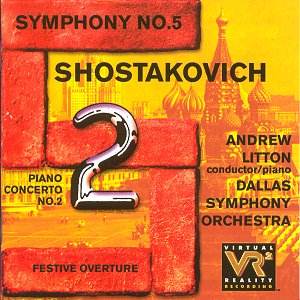This recording brings together what are probably the
composer’s three most popular works. The overture is an unashamed rabble-rouser,
the concerto is an undemanding yet wholly characteristic work, while
the symphony is an heroic masterpiece.
That said, this is a strangely unsatisfactory issue.
Andrew Litton is a musician for whom I have a great deal of respect,
but he suffers in these performances from that common affliction of
conductors – the desire to ‘say something’ about the music rather than
let it speak for itself. This mannered approach is evident from near
the beginning, where, after the introductory statement, the main theme
is presented in a hushed sotto voce by the violins, thus denying
the music a chance to settle into a forward momentum of any kind (Sample
1, track 5, opening). Later on, still in the first part of the movement,
the ‘second subject’ is presented lovingly. Yet why the little hold-up
at 5:11? It’s quite unnecessary, and disturbs the natural flow of the
music. The orchestra clearly agree with me, for here, as in the many
other similar places, they are obedient and ‘rehearsed’ rather than
musically flexible. Some of these mannerisms are just mildly annoying,
others extremely irritating, such as the exaggerated broadening-out
for every single presentation of the brass theme in the Allegretto,
which, together with the slowing down for the Trio, serves to undermine
the biting humour of the movement. (Sample 2, Track 6, 0:50). The beautiful
slow movement suffers perhaps worst of all, but the most bizarre symptom
of this ‘ritenutitis’ occurs in the finale, where the music threatens
to grind to a halt altogether at 3:16. This is truly awful! (Sample
3, Track 8, 2:42). Not surprisingly, the end of the symphony is dull;
no triumph, no tragedy. This may be a politically correct way of reading
the work, but as a musical experience it doesn’t begin to register.
The orchestral playing is, in the typical American fashion, suavely
beautiful, and the performance is undoubtedly meticulously prepared.
But over-prepared, perhaps, and the players simply don’t sound
as if they and their conductor have lived this music together.
The concerto is better, and the outer movements are
quite lively and entertaining. But the famous central Andante is
just far too slow! It takes 7 minutes 43 seconds to drag itself
through; compare that with the composer’s own performance (on Revelation
RV0006); he clocks in at 5:02! I know about artistic license etc., but
that’s plain ridiculous.
These pieces are all prolifically represented in the
catalogue, and the competition is commensurately intense. This one’s
a non-starter, I fear.
Gwyn Parry-Jones
